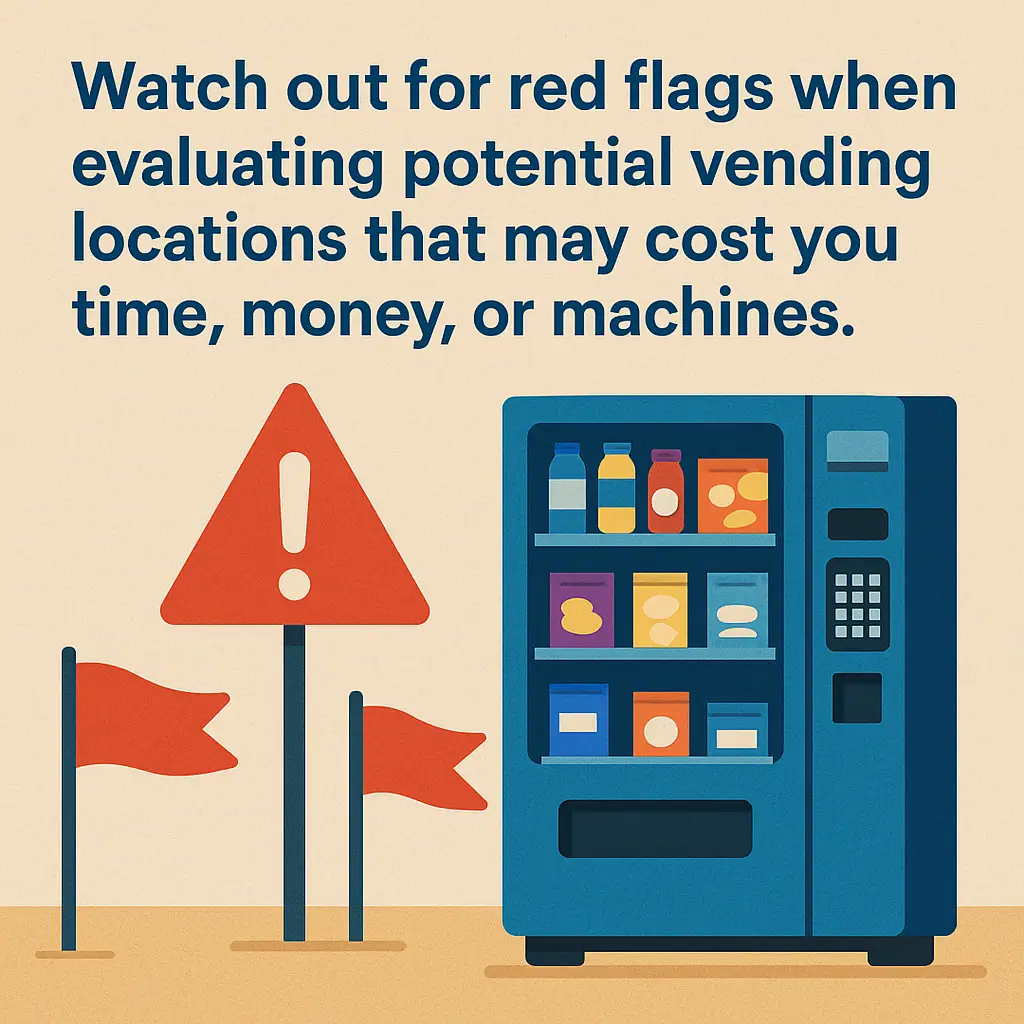Common Location Deal Breakers
Watch out for red flags when evaluating potential vending locations that may cost you time, money, or machines.
Back to Vending Machine Locators ResourcesWatch out for red flags when evaluating potential vending locations that may cost you time, money, or machines.
Back to Vending Machine Locators ResourcesStart your 30-day free trial and get instant SMS and email alerts whenever a local business needs vending service. These are real location leads to help you grow your route — you decide which ones to buy, no obligations or contracts.
![]() Low-traffic areas limit machine profitability
Low-traffic areas limit machine profitability
![]() Unsecured sites risk equipment theft or damage
Unsecured sites risk equipment theft or damage
![]() Lack of contact hinders service and communication
Lack of contact hinders service and communication
30 days free, then $39 / month.
No Commitment. Cancel Anytime.

Not every vending location is a good one, and overlooking red flags can waste your time, money, and machines. Before you commit to a site, it's critical to evaluate key deal breakers that signal a poor vending environment. One major concern is low foot traffic. If an office, apartment complex, or school doesn't have consistent daily volume, your machine may underperform no matter how well-stocked or advanced it is.
Another red flag is unreliable access. If you can't reach the machine for restocking or maintenance during business hours or are subject to unexpected building restrictions, your service will suffer. Being locked out of a site—even temporarily—can mean lost revenue and unhappy users. Similarly, properties that lack a reliable point of contact, such as an office manager or property supervisor, often lead to communication problems. Without someone to troubleshoot permissions or report issues when machines go down, problems compound fast.
Security also matters. Machines placed in poorly-lit, low-visibility, or high-risk areas are vulnerable to vandalism or theft. Any location that cannot ensure some level of staff presence or surveillance might not be worth the investment. It's also worth researching the site’s vending history. If multiple vendors have previously left due to disputes or poor machine treatment, that’s a major warning sign. Patterns of expired products, frequent breakdowns, or owner neglect usually continue unless major management changes have occurred.
Inadequate electrical capacity, lack of ventilation for coolers, or limited floor space are other operational roadblocks to check. You don't want to get to install day only to realize the power supply isn't sufficient or the machine blocks a fire exit. Vetting locations carefully upfront can save you weeks of lost machine time and ensure your operation only ties into stable, profitable sites.
For tips on how to identify technical or device-specific risks at a new location, check out our guide to vending repair basics. Also, you can explore how vending technology evolves to reduce onsite issues before they start.
Vending Exchange connects vending operators with real businesses actively looking for vending services—including traditional machines, AI coolers, and office coffee. Get instant SMS and email alerts when new opportunities are available in your area. No contracts or monthly fees—just buy the leads you want. Start your free 30-day trial today and grow your vending business on your terms.
Ask the property manager for occupancy data and observe the area during different times of day. Foot traffic of 30–50+ people daily is ideal for standard vending.
Without reliable access to service your machine—due to locked doors, changing hours, or staff limitations—stockouts and breakdowns can't be quickly addressed.
Not necessarily, but ask why past vendors left. A pattern of short-term vendors may hint at unresolved issues you might inherit.
Very. Areas without security or cameras are more prone to vandalism and theft, which can cause major losses or early machine retirement.
It becomes much harder to coordinate deliveries, repairs, or permissions. Make sure someone is officially responsible for vendor communication.
Yes. Coolers and combo machines need airflow. Poor ventilation can overheat compressors, reducing machine life or causing failures.
Absolutely. Insufficient or unstable electrical supply can damage equipment or cause safety issues. Always verify voltage and outlet availability first.
Evaluate if the volume supports a commission. For low-traffic sites, commissions can make a location financially unviable.
Ask how many vendors they’ve had, why they left, and whether there were service issues. A poor history may signal ongoing problems.
Frequent damage is a serious red flag. Consider relocating the machine or cutting ties with the location to avoid further loss.